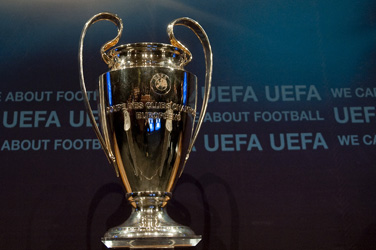In spite of a disappointing week for English sides in Europe, the recent news that the number of places available to Premier League teams in the Champions League is not under immediate threat will have come as some relief to those teams that annually battle it out for a spot in the domestic top four. For them it means the guarantee of a minimum of around £30 million extra income for taking part in UEFA’s blue riband competition (assuming the qualifying round is negotiated for the team finishing in fourth, which often seems to be Arsenal these days), and given the rising influence of Financial Fair Play, the extra income is welcome for clubs that now have to consider living within their means.
It’s also good news for Sky and BT Sport, given the huge amounts they have paid out for the domestic TV rights for live Premier League matches. Granted, Arsenal fans have come to scoff at Arsene Wenger’s infamous description of a top four place as being akin to a piece of silverware, but in the marketing of TV matches by broadcasters, the more that is at stake, the better.
Two things have changed significantly since the inception of the Premier League back in 1992, and both are related to income. The financial benefits of qualifying for the Champions League mean a far greater difference between finishing inside and outside the qualifying places (originally two, then three and now four). And the gulf between the earning potential of a Premier League and Championship club grows wider with every passing season. So some very high stakes to play for when it comes to the relegation battle.
This means that, with more at stake, more games matter, which makes for better TV drama in terms of live matches. If there were only two Champions League places to play for, the chances are that a lot of the games this season involving Arsenal, Manchester United, Liverpool, Spurs and Southampton would have held far less interest for the neutral and arguably even the fans of the sides concerned, with the idea that the top two places were already sewn up. In reality, Manchester City have hit a blip, so may not finish second after all, but fans watching games for most of the season would not have anticipated their drop in form and probably taken less interest in the matches of the teams competing for the other top four spots, if they did not have the reward of a Champions League place.
So undoubtedly, for the interest in the matches on TV and indeed in the flesh, the feeling that something is actually at stake is important. Many Arsenal fans have understandably grown a bit cynical about the battle for the top four, with familiarity breeding an element of contempt, but the reality is that as far as status is concerned, it does matter for a club of Arsenal’s reputation. We have seen how the Gunners’ recent Premier League matches have all become ‘must win’ games of late, with fixtures running out and a fairly low number of points separating the contenders for a Champions League spot. When Arsenal entertain Liverpool on their next fixture on Easter Saturday, they will be favourites (click here for William Hill’s football betting odds on forthcoming matches) to win a match that may well prove fatal for the visitors’ hopes of enjoying a second successive season back in the Champions League.
Looking at the Premier League table, realistically, only fixtures between three teams (Stoke, Swansea and West Ham) are completely meaningless. All those below could still, in theory, be dragged into the relegation battle, whilst all above will still harbour ambitions of a top four spot. When only pride is at stake, there is far less interest from a television audience, with the exception of a spicy local derby. And that is why that although the recent news about UEFA co-efficient rankings will have been welcomed by fans of those clubs with a chance of making the top four, it will have been of even more importance to Sky and BT Sport, given their huge investment in a product where every game has to matter.







